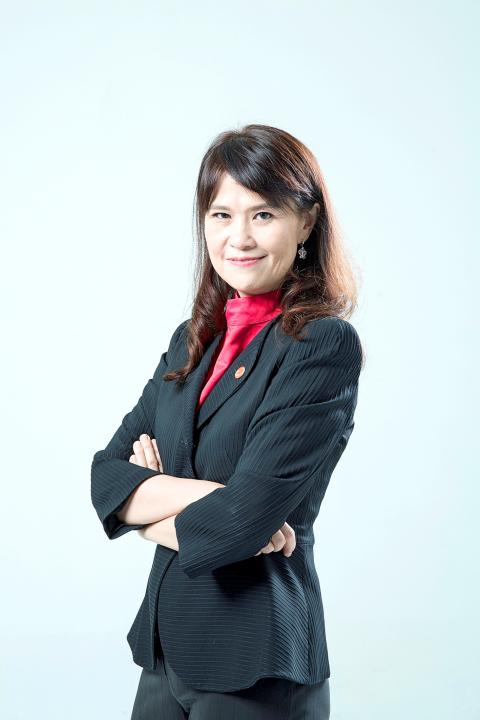Global auditor PwC this month released its annual Women in Work Index assessing female economic empowerment across 33 members of the Organization for Economic Co-operation and Development (OECD).
The top two positions went to Nordic countries Iceland and Sweden, followed by New Zealand in third place.
Taiwan is not a member of the OECD and was left out of the index, but its market economy “backed by democratic institutions and focused on the wellbeing of all citizens” arguably fits the profile.

Photo: Liao Chien-ying, Taipei Times
To find out how Taiwan’s 11.9 million women fare against their peers, the Taipei Times compares national data from this year’s report by the Executive Yuan’s Gender Equality Committee against the findings of the Women in Work Index.
SHARING THE SECOND SHIFT
When Taiwan elected its first female president in 2016, the result seemed to suggest that enlightened views on women at work prevailed. After all, the electorate had collectively hired a woman, President Tsai Ing-wen (蔡英文), for the job of leading the country.

Photo: CNA
But if Taiwan had been included in the Women in Work Index this year, its performance would have been middling at best.
Taiwan fares slightly better than the OECD average on two fronts: the gap between female and male wages (14 percent) and the female unemployment rate (3.5 percent). It just scrapes into the top 10 for both.
However, it is bogged down by a relatively low rate of female labor force participation (50.9 percent) and a sizeable gap between female and male labor force participation (16.2 percent), placing near the bottom of the index on these indicators.
The index measures female economic empowerment based on a weighted average of the above four indicators, plus a fifth — share of female employees in full-time employment — for which national data is not available.
National Chengchi University Institute for Labor Research professor Liu Mei-chun (劉梅君) says that the “second shift” of domestic responsibilities placed on working women remains the most significant obstacle to female economic empowerment in Taiwan today.
According to the Gender Equality Committee, married or cohabiting women spend more than three times as much time on unpaid work, which includes housework, childcare and caring for other family members, averaging 3.81 hours per day compared to their partners’ 1.13 hours.
Some women do not even get to try balancing work and family. Sexist stereotypes that women are more well-suited to domesticity and that their work performance will suffer after they get married or have a child can result in employers taking matters into their own hands, by withholding professional opportunities, promotions and mentorship.
In extreme cases, some expectant mothers are forced out of a job against their will, and against proper workplace practices.
In 2013, a machinery factory in Tainan hired Kao Ching-wen (高靜雯) as an accountant, but fired her just one month into the job after she became pregnant. The employer made Kao sign a voluntary termination of service form, which allowed them to withhold her severance pay.
“I was even scolded for causing inconvenience to other people,” Kao says. Despite the unfair treatment, she acknowledges that she was already somewhat fortunate, as women in dire financial straits would have had more difficulty coping with the sudden loss of income.
Kao is now president of the Zonta Club of Tainan Phoenix (國際崇她台南鳳凰社), a chapter of the Zonta International organization dedicated to advancing the status of women, and encourages sharing of career and life experiences among working women.
Referring to a snapshot survey released by online job bank Yes123 this month, which found that almost 60 percent of female respondents had experienced some form of gender discrimination at work, Kao says she is not surprised at the findings.
The rate of female labor participation peaks among women aged 25 to 29 before declining. This coincides with the average age of first-time mothers at 30.8 years. Similar declines are observed in Japan and South Korea, but whereas the decline is temporary there, the female labor participation rate in Taiwan does not recover.
In 2016, 20.26 percent of unemployed women had left their jobs because of marriage or childbirth and not returned to the workforce.
For women to have equal opportunity to excel at work, National Chengchi University Institute for Labor Research professor Liu Mei-chun (劉梅君) says that provision of childcare and eldercare needs to be converted into a public good, by establishing more high-quality and affordable care facilities.
CLASSROOMS AND BOARDROOMS
National data paints a more promising picture of women pursuing education and breaking the corporate glass ceiling.
Since 2014, female students have slightly outnumbered male students in tertiary education, reaching 50.62 percent in 2017.
Liu says that this likely arises from a confluence of factors. More disposable incomes and the rapid development of the university sector in the past few decades have made more resources available to pursue tertiary education.
But just as importantly, lower rates of childbirth mean that the old-fashioned mindset of sons being better than daughters (重男輕女) is no longer viable. Parents are investing in their children’s education, regardless of gender.
Liu adds that receiving higher education tends to raise the opportunity cost of unemployment, so having more female graduates is likely to contribute to Taiwan’s female labor participation rate.
Some female employees can look forward to becoming company directors or owning their own businesses.
Female boardroom representation at 13.5 percent, or 2,245 out of all directors of public companies, is significantly better than in Japan (5 percent) and South Korea (2 percent), but still lags far behind male counterparts.
That said, Taiwan has its share of powerful businesswomen. Last year, Mercy Wu (吳旻潔), chairwoman and CEO of Eslite Spectrum, was named on the Forbes Asia Emergent Women 25 list. In 2016, Forbes Asia recognized Eva Chen (陳怡樺), CEO of Trend Micro (趨勢科技), a global computer security leader, as one of 50 Power Business Women.
Outside of the conglomerates, Taiwan’s 1.4 million small and medium-sized enterprises (SMEs) are a backbone of the economy, recognized for providing employment and a path to social mobility. With 36.7 percent of all SMEs headed by women, they are also increasingly a path to female economic empowerment.
These working women, alongside unemployed women who are active in their communities, are in the best position to drive changes in corporate culture and foster gender equality, starting from the smallest acts.
Take Kao for example. Now, she says, women are encouraged to bring their children to meetings at the Zonta Club.

Dissident artist Ai Weiwei’s (艾未未) famous return to the People’s Republic of China (PRC) has been overshadowed by the astonishing news of the latest arrests of senior military figures for “corruption,” but it is an interesting piece of news in its own right, though more for what Ai does not understand than for what he does. Ai simply lacks the reflective understanding that the loneliness and isolation he imagines are “European” are simply the joys of life as an expat. That goes both ways: “I love Taiwan!” say many still wet-behind-the-ears expats here, not realizing what they love is being an

Google unveiled an artificial intelligence tool Wednesday that its scientists said would help unravel the mysteries of the human genome — and could one day lead to new treatments for diseases. The deep learning model AlphaGenome was hailed by outside researchers as a “breakthrough” that would let scientists study and even simulate the roots of difficult-to-treat genetic diseases. While the first complete map of the human genome in 2003 “gave us the book of life, reading it remained a challenge,” Pushmeet Kohli, vice president of research at Google DeepMind, told journalists. “We have the text,” he said, which is a sequence of

Every now and then, even hardcore hikers like to sleep in, leave the heavy gear at home and just enjoy a relaxed half-day stroll in the mountains: no cold, no steep uphills, no pressure to walk a certain distance in a day. In the winter, the mild climate and lower elevations of the forests in Taiwan’s far south offer a number of easy escapes like this. A prime example is the river above Mudan Reservoir (牡丹水庫): with shallow water, gentle current, abundant wildlife and a complete lack of tourists, this walk is accessible to nearly everyone but still feels quite remote.

It’s a bold filmmaking choice to have a countdown clock on the screen for most of your movie. In the best-case scenario for a movie like Mercy, in which a Los Angeles detective has to prove his innocence to an artificial intelligence judge within said time limit, it heightens the tension. Who hasn’t gotten sweaty palms in, say, a Mission: Impossible movie when the bomb is ticking down and Tom Cruise still hasn’t cleared the building? Why not just extend it for the duration? Perhaps in a better movie it might have worked. Sadly in Mercy, it’s an ever-present reminder of just